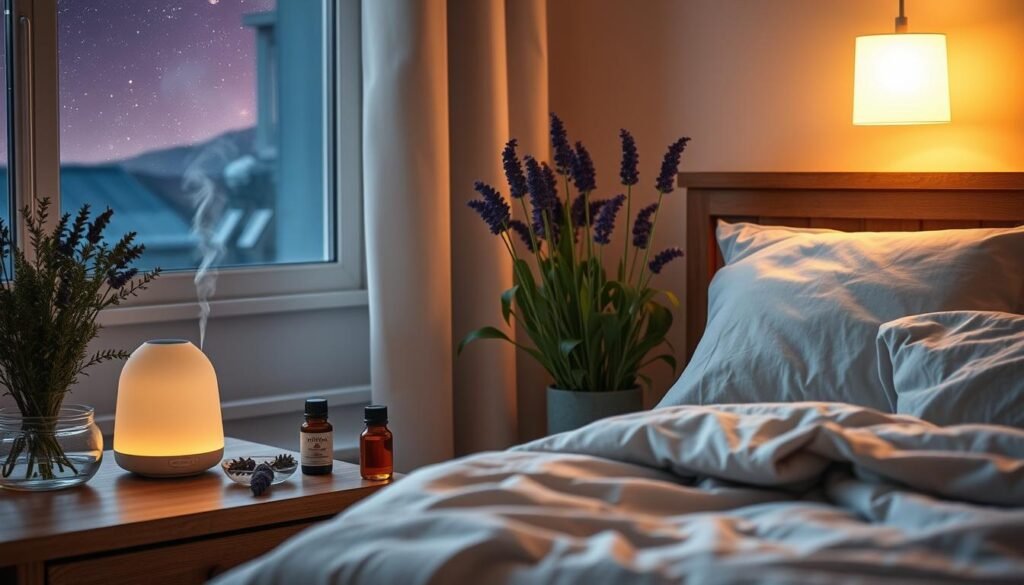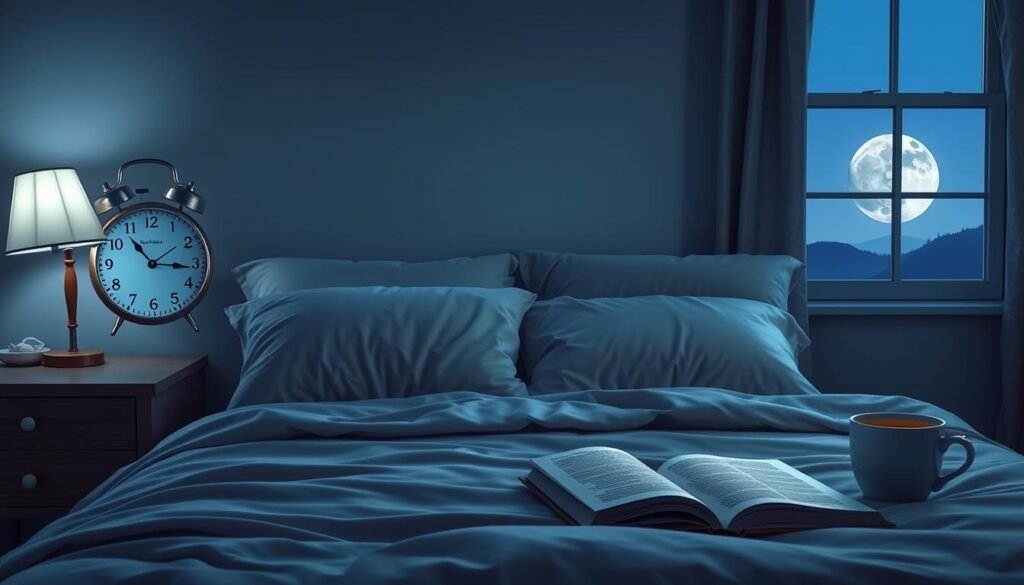Sleep is key to our health and happiness. Yet, many face insomnia, a hard time falling or staying asleep. This article will show you how to beat insomnia naturally. You’ll learn to get the sleep your body and mind need.
Key Takeaways
- Discover the common types of sleep disorders and their impact on daily life
- Understand the science behind natural sleep regulation and the role of circadian rhythms
- Learn essential sleep hygiene practices to improve sleep quality
- Explore natural remedies and supplements that can enhance your sleep
- Discover mind-body techniques for relaxation and better sleep
- Create the optimal sleep environment by considering temperature, lighting, and sound management
- Develop healthy sleep habits for long-term restful sleep
Understanding Sleep Disorders and Their Impact on Daily Life
Good sleep is key for our health and mind. But, many people face sleep disorders. These issues can lower our energy, hurt our thinking, and harm our life quality. Knowing about sleep disorders and their effects is the first step to solving them.
Common Types of Sleep Disorders
The top sleep disorders are insomnia, sleep apnea, and restless leg syndrome. Insomnia makes it hard to fall or stay asleep. Sleep apnea blocks the airway, causing sleep breaks. Restless leg syndrome makes you want to move your legs a lot, which can mess up sleep.
Start your transformation now!
The Physical and Mental Effects of Poor Sleep
Poor sleep badly affects our body and mind. It can make us less smart, weaken our immune system, and raise the risk of diseases like obesity and diabetes. It also can cause mood problems like depression and anxiety, and make us less productive.
Identifying Your Sleep Patterns
- Watch your sleep habits, like bedtime and wake-up times, and how well you sleep.
- Keep a sleep diary to track your sleep and find any problems.
- Look for signs of sleep disorders, like trouble sleeping, feeling tired during the day, or odd sleep movements.
By knowing about sleep disorders and how they affect us, we can start to find ways to improve. This helps our mind-body connection and overall well-being.

Conquering Insomnia Naturally: A Path to Restful Sleep
Insomnia can be really tough and hard to deal with. But, there are natural ways to beat it and get the sleep you need. We’ll look at different strategies to help you sleep well without pills.
These natural remedies can fix the real reasons for insomnia, not just cover it up. By changing your lifestyle, using relaxation methods, and taking sleep-promoting supplements, you can fight insomnia naturally. This way, you can sleep better and feel better overall.
If you have trouble sleeping, staying asleep, or waking up tired, we have solutions for you. These natural methods can help you sleep better. They can also make you feel better and live a better life.

We’ll go into the science of natural sleep, talk about sleep hygiene, and share natural remedies and mind-body techniques. These can help you beat insomnia and get the sleep you deserve.
“Sleep is the best meditation.” – Dalai Lama
The Science Behind Natural Sleep Regulation
Sleep is key to our health and happiness. Knowing how our bodies naturally sleep can help us rest better. Two important things are our circadian rhythms and how our body makes melatonin.
How Circadian Rhythms Affect Sleep Quality
Our circadian rhythms are like internal clocks that control our sleep. They are set by things like the sun rising and setting. When our rhythms match, we sleep better and wake up more easily.
The Role of Melatonin in Sleep-Wake Cycles
Melatonin is a hormone made in our brain that helps us sleep. It goes up when it gets dark and down when it’s light. Having the right amount of melatonin is key for good sleep.
Natural Light and Sleep Patterns
Being in natural light, especially during the day, helps our circadian rhythms and melatonin supplements. Sunlight keeps our internal clock in sync with day and night. Not using artificial light at night helps our melatonin and sleep quality.
“Maintaining a consistent sleep-wake schedule and being mindful of light exposure can have a profound impact on the quality of our sleep and overall well-being.”
Essential Sleep Hygiene Practices for Better Rest
Getting quality sleep is key for health and happiness. Good sleep hygiene helps improve sleep and brings many benefits. Let’s look at important practices to beat insomnia and sleep better.
Maintain a Consistent Sleep Schedule
Having a regular sleep schedule is vital. Try to sleep and wake up at the same time every day. This helps your body’s clock and makes sleep better.
Create a Relaxing Bedtime Routine
Make a calming bedtime routine. It could be a warm bath, stretching, or reading. These activities help your body relax for sleep.
Limit Screen Time Before Bed
Electronic devices can mess with your sleep. Try not to use phones or computers an hour before bed. Choose a quiet activity instead.
Optimize Your Sleep Environment
Make your bedroom dark, cool, and quiet. Use curtains or masks for light, and earplugs or machines for sounds. A clean, comfy room also helps sleep.
“Sleep is the golden chain that ties health and our bodies together.” – Thomas Dekker
Adding these sleep habits to your day can help a lot. Good sleep is the base for a healthy, happy life.
Natural Remedies and Supplements for Sleep Enhancement
Getting a good night’s sleep is key for health. There are many natural ways to help you sleep better. We’ll look at herbal teas, supplements, and foods that help sleep.
Herbal Teas and Their Sleep-Promoting Properties
Drinking herbal tea can calm you down before bed. Chamomile and valerian root teas are great for sleep. They help your brain relax and make it easier to fall asleep.
Dietary Supplements for Better Sleep
There are also supplements that help you sleep well. Melatonin is a hormone that helps your body sleep. It can help your body’s clock work better. Magnesium and L-theanine can also make you feel calm and sleep better.
Foods That Support Healthy Sleep Patterns
- Tryptophan-rich foods, like turkey, eggs, and nuts, can increase serotonin and melatonin production, aiding in the sleep-wake cycle.
- Complex carbohydrates, such as whole grains and starchy vegetables, can help boost serotonin levels and promote relaxation.
- Fatty fish, like salmon, are rich in vitamin D and omega-3 fatty acids, which have been linked to improved sleep quality.
Adding these natural remedies and sleep foods to your life can help you sleep better. Everyone is different, so you might need to try a few things to find what works for you.
Mind-Body Techniques for Relaxation and Sleep
Getting good sleep is key for feeling well. But, many people have trouble sleeping. Mind-body techniques can help relax and improve sleep by linking our mind and body.
Meditation calms the mind and helps us relax deeply. It focuses on breathing and being in the moment. Regular meditation can make sleep better and longer.
Deep breathing exercises also help relax. They calm the body’s stress response. This makes muscles relax and helps us feel calm for sleep.
- Try the 4-7-8 breathing method: inhale for 4 seconds, hold for 7 seconds, and exhale for 8 seconds.
- Progressive muscle relaxation, where you tense and release muscles, can also help relax and prepare for sleep.
Gentle yoga or stretching before bed is good too. It mixes movement, breathing, and focus. This helps us relax and sleep better.
“The greatest weapon against stress is our ability to choose one thought over another.” – William James
Using these mind-body techniques can improve your sleep. They connect your mind and body for better rest and feeling refreshed.
Creating the Optimal Sleep Environment
Making your bedroom sleep-friendly is key. The best temperature for sleep is between 65°F and 70°F. This helps your body stay cool while you sleep.
Keep your room dark and avoid blue lights before bed. This helps your body make melatonin, the sleep hormone.
Temperature and Lighting Considerations
Having the right temperature and light in your bedroom is important. Keep it between 65°F and 70°F. This helps you sleep better.
Also, turn off bright lights and blue lights before bed. This helps your body make melatonin, making it easier to sleep.
Bedroom Organization for Better Sleep
How your bedroom looks can affect your sleep. Keep it tidy and calm. This helps you relax and sleep better.
Use your bedroom only for sleep and love. Don’t work or play there. This helps your brain think of it as a sleep place.
Sound Management Techniques
Getting rid of loud noises is important. Use white noise machines, earplugs, or soft music. These can block out sounds and help you sleep.
Try different ways to manage sound. Find what works best for you.

